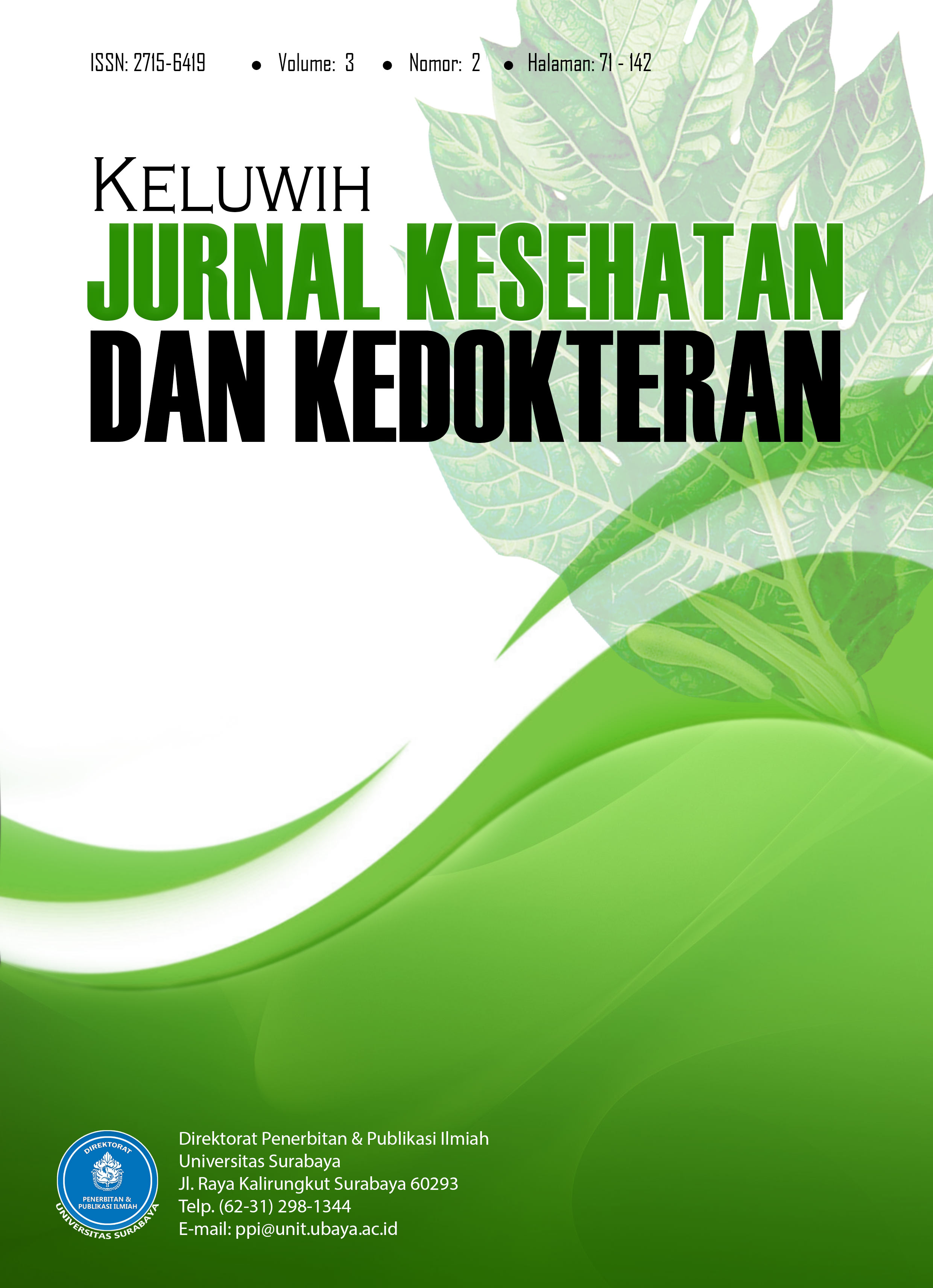Perbedaan Perceived Susceptibility dan Severity Pelaksanaan Protokol Kesehatan Covid-19 Masyarakat Perkotaan dan Pedesaan
 Abstract Views:
3273 times
Abstract Views:
3273 times
 PDF Downloads:
914 times
PDF Downloads:
914 times
Abstract
Abstract—Perceived Susceptibility is an individual's subjective perception of the risk of getting a disease, and Perceived Severity is information that a person believes about the severity or seriousness of a disease. A person with high Perceived Susceptibility and Perceived Severity can improve preventive behavior against Covid-19. The purpose of this study was to analyze the differences in Perceived Susceptibility and Perceived Severity in the implementation of the Covid-19 health protocol in urban and rural communities. The research method is quantitative in the form of observational analytic study with cross sectional approach. Data was collected in urban and rural areas with 88 total of respondents. The results of the analysis with the Mann Whitney test show that there is a difference in Perceived Susceptibility based on urban and rural area(p=0.001), education level(p=0.001), occupation(p=0.008), experience of being diagnosed with Covid-19(p=0.025) and there are not any difference based on the source of information(p=0.938). There are differences in Perceived Severity based on urban and rural areas(p=0.026), education level(p=0.005), occupation(p=0.012), experience of being diagnosed with Covid-19 (p= 0.03) and there are not any differences based on the source of information(p=0.877). This study shows that urban communities have higher Perceived Susceptibility and Perceived Severity in the implementation of the Covid-19 health protocol than rural communities.
Keywords: covid-19 health protocol, perceived susceptibility, perceived severity
Abstrak—Perceived Susceptibility atau persepsi kerentanan merupakan persepsi subyektif seorang individu terhadap risiko terkena suatu penyakit sedangkan Perceived Severity atau persepsi keseriusan merupakan persepsi yang diyakini seseorang tentang suatu keparahan atau keseriusan suatu penyakit. Seseorang dengan Perceived Susceptibility (persepsi kerentanan) dan Perceived Severity (persepsi keseriusan) yang tinggi terhadap Covid-19 dapat meningkatkan perilaku pencegahan terhadap Covid-19. Tujuan penelitian ini adalah menganalisis perbedaan Perceived Susceptibility dan Perceived Severity dalam pelaksanaan protokol kesehatan Covid-19 pada masyarakat perkotaan dan pedesaan. Penelitian menggunakan metode kuantitatif berupa studi analitik observasional dengan pendekatan cross sectional. Pengambilan data dilakukan secara consecutive sampling di dua lokasi yaitu di wilayah perkotaan dan pedesaan dengan total responden sebanyak 88 orang. Hasil analisis dengan Uji Mann Whitney menunjukan adanya perbedaan Perceived Susceptibility berdasarkan wilayah perkotaan dan pedesaan (p=0,001), pendidikan (p=0,001), pekerjaan (p=0,008), pengalaman positif Covid-19 (p=0,025) dan tidak ditemukan adanya perbedaan berdasarkan sumber informasi (p=0,938). Sedangkan untuk Perceived Severity ditemukan adanya perbedaan berdasarkan wilayah perkotaan dan pedesaan (p=0,026), pendidikan (p=0,005), pekerjaan (p=0,012), pengalaman positif Covid-19 (p=0,03) dan tidak ditemukan adanya perbedaan berdasarkan sumber informasi (p=0,877). Penelitian ini menunjukkan masyarakat perkotaan memiliki Perceived Susceptibility dan Perceived Severity yang lebih tinggi dalam menjalankan protokol kesehatan Covid-19 dibanding masyarakat pedesaan.
Kata kunci: protokol kesehatan covid-19, perceived susceptibility, perceived severity
Downloads
References
Afrianti, N., Rahmiati, 2021. Faktor-Faktor yang Mempengaruhi Kepatuhan Masyarakat terhadap Protokol Kesehatan Covid-19, Jurnal Ilmiah STIKES Kendal.
Andriani Karo, D.B., Tahlil, T., 2015. Faktor Transkultural Persepsi Kesehatan Ibu Dengan Balita ISPA. Jurnal Ilmu Keperawatan 3, 1.
Dhayanithi, J., Balaji Ganesh, S., Brundha, M.P., 2020. Perception and awareness of covid-19 among urban and rural population – a survey. International Journal of Current Research and Review 12, 135–142.
Fanani, S., Dewi, T.K., 2014. Health Belief Model pada Pasien Pengobatan Alternatif Supranatural dengan Bantuan Dukun, Jurnal Psikologi Klinis dan Kesehatan Mental.
Komite Penanganan Covid-19 dan Pemulihan Ekonomi Nasional, 2020. Kepatuhan Masyarakat Terhadap Protokol Kesehatan Harus Ditingkatkan. URL https://covid19.go.id/p/berita/kepatuhan-masyarakat-terhadap-protokol-kesehatan-harus-ditingkatkan
Kundari, N.F., Hanifah, W., Azzahra, G.A., Islam, N.R.Q., Nisa, H., 2020. Hubungan Dukungan Sosial dan Keterpaparan Media Sosial terhadap Perilaku Pencegahan COVID-19 pada Komunitas Wilayah Jabodetabek Tahun 2020. Media Penelitian dan Pengembangan Kesehatan 30.
Menteri Kesehatan Republik Indonesia, 2020. Peraturan Menteri Kesehatan Republik Indonesia Pedoman Pembatasan Sosial Berskala Besar dalam Rangka Percepatan Penanganan Corona Virus Disease 2019.
Notoatmodjo S, 2014. Ilmu Perilaku Kesehatan.
Pemerintah Kota Semarang, 2021. Informasi Coronavirus (Covid-19) Semarang.
Ratna Hidayani, W, P., Respati, Stik., 2020. Faktor Faktor Risiko Yang Berhubungan Dengan COVID 19 : Literature Review, JUKMAS Jurnal Untuk Masyarakat Sehat (JUKMAS) e-ISSN.
Scarinci, I.C., Pandya, V.N., Kim, Y. il, Bae, S., Peral, S., Tipre, M., Hardy, C., Hansen, B., Baskin, M.L., 2021. Factors Associated with Perceived Susceptibility to COVID-19 Among Urban and Rural Adults in Alabama. Journal of Community Health 46, 932–941.
Setiyaningsih, R., Tamtomo, D., Suryani, N., 2016. Health Belief Model: Determinants of Hypertension Prevention Behaviorin Adults at Community Health Center, Sukoharjo, Central Java. Journal of Health Promotion and Behavior 01, 160–170.
Suparmini, W.A., 2015. Buku Ajar Masyarakat Desa dan Kota (Tinjauan Geografis, Sosiologis dan Historis).
Susilo, A., Martin Rumende, C., Pitoyo, C.W., Djoko Santoso, W., Yulianti, M., Sinto, R., Singh, G., Nainggolan, L., Nelwan, E.J., Khie Chen, L., Widhani, A., Wijaya, E., Wicaksana, B., Maksum, M., Annisa, F., Jasirwan, C.O., Yunihastuti, E., 2020. Coronavirus Disease 2019: Tinjauan Literatur Terkini, Jurnal Penyakit Dalam Indonesia |.
World Health Organization, 2021. WHO Coronavirus (Covid-19) Dashboard Situation by Country, Territory & Area. URL https://covid19.who.int/table

This work is licensed under a Creative Commons Attribution-ShareAlike 4.0 International License.
- Articles published in Keluwih: JKK are licensed under a Creative Commons Attribution-ShareAlike 4.0 International license. You are free to copy, transform, or redistribute articles for any lawful purpose in any medium, provided you give appropriate credit to the original author(s) and the journal, link to the license, indicate if changes were made, and redistribute any derivative work under the same license.
- Copyright on articles is retained by the respective author(s), without restrictions. A non-exclusive license is granted to Kluwih: JKK to publish the article and identify itself as its original publisher, along with the commercial right to include the article in a hardcopy issue for sale to libraries and individuals.
- By publishing in Keluwih: JKK, authors grant any third party the right to use their article to the extent provided by the Creative Commons Attribution-ShareAlike 4.0 International license.

 DOI:
DOI:






